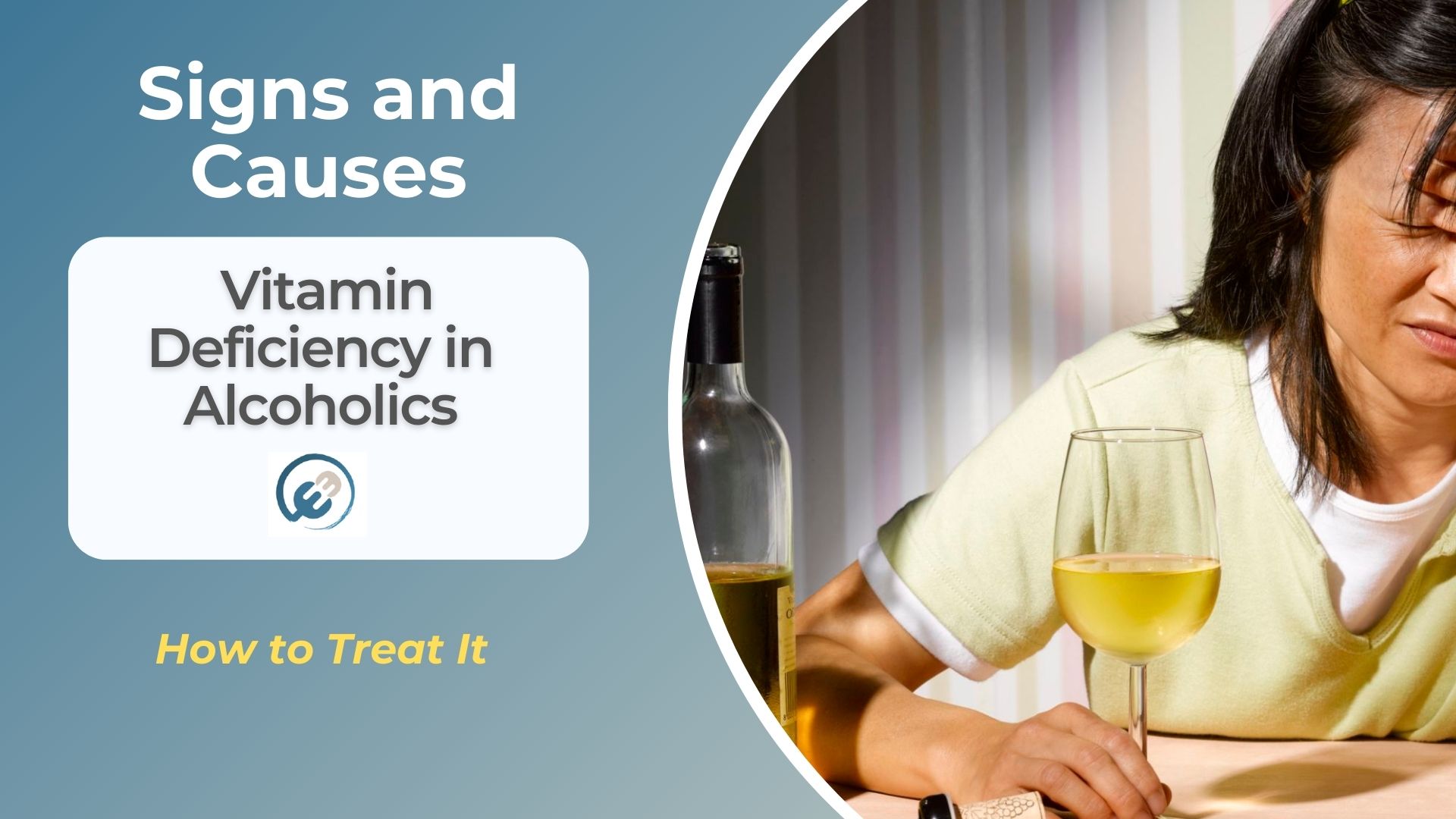Do you often feel tired and run down? Do you have a poor appetite, or problems with your digestion? If so, you may be suffering from vitamin deficiency as a result of alcoholism.
This is a common problem in alcoholics, and can lead to some very serious health problems if left untreated.
In this post, we will discuss the signs and causes of vitamin deficiency in alcoholics, as well as how to treat it.
Alcohol abuse can lead to many different types of essential vitamins deficiencies. The three most common are deficiencies in vitamins A, B, and C.
So if you are concerned that you may be deficient in vitamins, read on!
What is Thiamine?

Thiamine, also known as vitamin B-12, is a water soluble vitamin that is found in many foods. It is essential for the proper function of the nervous system, and it helps to convert glucose into energy.
A deficiency of thiamine can cause a condition called Wernicke-Korsakoff syndrome, which is a type of brain damage. This syndrome can cause confusion, memory loss, and problems with muscle coordination.
If you are a person with alcohol struggles, you may be at risk for deficiency of thiamine. This is because alcohol interferes with the absorption of thiamine in the intestines. Additionally, alcoholism can lead to malnutrition, which can also cause a thiamine deficiency.
Wernicke–Korsakoff Syndrome
Wernicke–Korsakoff syndrome (WKS) is a neurological disorder that results from a thiamine (vitamin B-12) deficiency. It typically consists of two distinct conditions: Wernicke’s encephalopathy and Korsakoff’s psychosis.
Wernicke’s encephalopathy is characterized by a triad of symptoms:
- Confusion
- Ataxia (loss of muscle coordination)
- Ophthalmoplegia (paralysis of the muscles that control eye movement)
Korsakoff’s psychosis is characterized by amnesia and confabulation. Amnesia is a loss of memory, and confabulation is the filling in of gaps in memory with made-up stories.
WKS is often seen in alcoholics, as alcoholism can cause a thiamine deficiency. This is because alcohol interferes with the absorption of thiamine in the intestines. Additionally, alcoholism can lead to malnutrition, which can also cause a thiamine deficiency.
Alcohol addiction can cause a wide variety of deficiencies of vitamin, which can have serious consequences if left untreated. If you are a person who struggles with alcohol, or if you are concerned that you may be deficient in thiamine, it is important to seek medical help.
WKS can be treated with thiamine supplements, and the sooner it is diagnosed, the better the outcome will be.
Thiamine Deficiency And Its Impact On The Nervous System

As we have seen, a thiamine deficiency can cause some serious problems. But how does thiamine deficiency actually impact the nervous system?
Thiamine is essential for the proper function of the nervous system. It helps to convert glucose into energy, and it is necessary for the proper development and function of nerve cells.
A thiamine deficiency can cause a condition called Wernicke-Korsakoff syndrome, which is a type of brain damage, as we already discussed above.
Additionally, a thiamine deficiency can lead to beriberi, which is a disease that affects the nervous system. Beriberi can cause weakness, pain, and paralysis of the muscles.
How does alcohol affect thiamine levels?

As we have seen, a thiamine deficiency can cause some serious problems. But how does alcohol actually impact thiamine levels in the body?
As we mentioned before, alcoholism can lead to malnutrition. This is because alcoholics often do not eat a balanced diet, and they may not get enough of the vitamins and minerals that they need. Additionally, alcoholism can lead to liver damage, which can also impact thiamine levels.
Alcohol also interferes with the absorption of thiamine in the intestines. This means that even a person with alcohol use disorder is eating a balanced diet, they may still be deficient in thiamine.
Additionally, alcohol consumption can increase the amount of thiamine that is excreted in urine. This means that even if a person with alcoholism is consuming enough thiamine, they may still be deficient because their body is not able to absorb and use it properly.
Do you suffer from a vitamin deficiency?

If you are deficient in thiamine, you may experience some of the following symptoms:
- Confusion
- Memory loss
- Problems with muscle coordination
- Weakness
- Pain
- Paralysis
If you experience any of these symptoms, it is important to seek medical help. A thiamine deficiency can be treated with supplements, and the sooner it is diagnosed, the better the outcome will be.
Is it possible to treat a vitamin deficiency?

Yes, it is possible to treat a vitamin deficiency. If you are deficient in thiamine, you may be prescribed thiamine supplements. Additionally, if you are a person with alcohol use disorder, you may be advised to stop drinking alcohol and to eat a balanced diet.
If you have liver damage, your doctor may recommend that you take vitamin supplements. Additionally, if you have a thiamine deficiency, your doctor may recommend that you take vitamin B12 injections.
Treatments

If you are diagnosed with a thiamine deficiency, you may be prescribed thiamine supplements. Additionally, you may be advised to stop drinking alcohol and to eat a balanced diet.
If you have liver damage, your doctor may recommend that you take vitamin supplements. Additionally, if you have a thiamine deficiency, your doctor may recommend that you take vitamin B12 injections.
The sooner a thiamine deficiency is diagnosed, the better the outcome will be. If you experience any of the symptoms listed above, it is important to seek medical help right away.
With proper treatment, you can improve your symptoms and avoid serious complications.
alcoholism, vitamin deficiency, thiamine levels, Wernicke-Korsakoff syndrome, beriberi, confusion, memory loss, muscle coordination, weakness, pain , paralysis, supplements, injections , diet , liver damage.
If you suffer from alcoholism, you may be at risk for developing a vitamin deficiency.
Vitamin deficiencies can cause a variety of symptoms, including confusion, memory loss, and problems with muscle coordination. Additionally, a thiamine deficiency can lead to beriberi or Wernicke-Korsakoff syndrome.
Foods rich in thiamine include:
Foods are often best to treat a deficiency, alcoholism can damage the liver which may make it difficult to process and use supplements.
- pork
- rice
- eggs
- peanuts
- oranges
- green vegetables
If you have liver damage, your doctor may recommend that you take vitamin supplements. Additionally, if you have a thiamine deficiency, your doctor may recommend that you take vitamin B12 injections. The sooner a thiamine deficiency is diagnosed, the better the outcome will be.
Conclusion
If you suffer from alcoholism, you may be at risk for developing a vitamin deficiency. Vitamin deficiencies can cause a variety of symptoms, including confusion, memory loss, and problems with muscle coordination. Additionally, a thiamine deficiency can lead to beriberi or Wernicke-Korsakoff syndrome.
Stop drinking alcohol as best you can and eat a balanced diet including foods rich in thiamine, such as pork, rice, eggs, peanuts, oranges, and green vegetables.
If you have liver damage, your doctor may recommend that you take vitamin supplements. Additionally, if you have a thiamine deficiency, your doctor may recommend that you take vitamin B12 injections.
The sooner a thiamine deficiency is diagnosed, the better the outcome will be. With proper treatment, you can improve your symptoms and avoid serious complications



